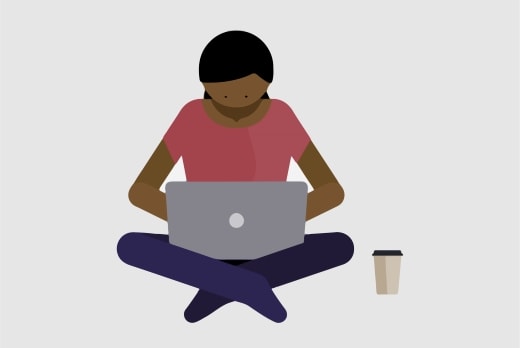Updated: May 23, 2023
You were so excited when you were shortlisted for your dream job, but you're pretty sure you tanked the interview. You flubbed a few questions. You feel terrible and are wondering if there's anything you can do after the fact to fix a bad interview.
"Realizing you messed up on an interview can be a powerless feeling, especially if the opportunity was one you were very excited about," says Robin Schwartz, human resources director at Career Igniter, a career exploration website based in Baltimore. "Being rejected by a company is a hit to the self-esteem."
But Schwartz believes that in some cases you might be able to redeem yourself and even get the job. If all else fails, she thinks bad interviews are a great opportunity to learn so that you don't make the same mistakes again.
Take advantage of these helpful tips on what to do after a bad interview.
Follow up with a thank you
"Being able to redeem a bad interview depends entirely on why it was bad," Schwartz says. "If the company doesn't feel like you have the skills needed for the position, it's unlikely you can redeem yourself. But if an interviewer thought you had the skills to do the job on paper but you just didn't present well in person, you might be able to redeem the interview by sending a clarifying thank you note." Here's how:
Be honest. It's okay to admit that you may have struggled with a particular question. If you feel that your answer was not as clear as you would have liked, take the opportunity to clarify or expound upon the answer. "If you were nervous, make mention of that," Schwartz says. "Maybe you are currently working on your public speaking skills or challenging yourself to take risks. If that's the case, tell the interviewer that in a follow-up as well. They may appreciate your honesty and perseverance enough to give you another chance."
Show initiative. You could shift an employer's opinion of you if you include something with your thank you note showing that you've put thought into the position after the interview. For example, if you interviewed for a sales job, sending a list of leads for new clients shows that you can take initiative. You could also send the interviewers a link to an interesting article that touches on a topic that you discussed.
Schwartz also suggests you reiterate how interested you are in the opportunity and thank the interviewers for the chance to discuss it with them.
Evaluate and learn
After a bad interview, it's crucial you understand what you did wrong so you can ensure you don't make the same mistake again. This can include parsing what happened yourself or possibly asking the interviewer for feedback.
Caroline Thorpe, a former executive coach, suggests you go over the interview yourself first and write down what went wrong.
"Hit the low hanging fruit," she says. "Did you arrive on time? Were you nice to the person who checked you in? Did you do the research on the company or did you expect them to tell you basic information about the company?"
These small details can make a huge difference, Schwartz agrees.
"You should really evaluate everything from the start of the interview to the end. Were you simply unprepared for their questions, or did you not have applicable work examples ready for them?" she says. "Overall, was the bad interview something you felt you could have controlled or something that was beyond your ability to prevent?"
Prepare for next time
The next time you have an interview, prepare to put everything that you've learned from your bad interview to use. If you didn't do enough research on the company start there.
"Anything that helps you have a clearer sense of what to expect on future interviews will increase your preparedness and reduce your stress of the unknown," says Judy Panagakos, a master career coach and mentor. "Use it all—Glassdoor, peers, and friends who work there."
Job and recruiting websites often list things like common interview questions that specific companies ask. Checking these sites as part of your interview prep can help.
Thorpe also suggests you focus on the specifics of the interview—the department you might work for and the interviewers.
"Do research on the company and department you will be working at," says Thorpe. "Look up your interviewer on LinkedIn®. Do you have anything in common with them? Schools, charities, professional organizations? Do you know anyone in common?"
Once you have all the information that you need, Schwartz suggests you practice answers to common questions.
"Create a response to some basic interview questions like 'Tell me about yourself,' or 'Why are you interested in the position?' and practice them out loud," she says. "Pay attention to whether you use filler words like um, like, or uh. Practicing your responses will help you in staying calm under pressure."
She suggests you pay attention to your body language to make sure it shows that you are excited about the opportunity. This includes sitting up straight or leaning in as you talk, smiling, and using your hands to show excitement.
To make your practice more realistic, seek a sparring partner. "Friends can help you role-play for an upcoming interview," says Schwartz. "This is especially recommended if you find yourself a bit nervous. Practice makes perfect, right? In interviews, it certainly helps."
Know there'll be other chances
Even if you can't redeem your interview, it won't be your last shot at a great job and career.
"This isn't your last chance. There will be more interviews and more opportunities if you just keep looking," says Schwartz. "Obsessing over an interview that went poorly often keeps you from being open to other opportunities and putting yourself back out in the candidate pool."
"The best strategy is to commit to being more prepared in the future. That's how you will avoid regrets afterwards," says Schwartz.
"Interviewees who feel they did their best will be more at peace with whatever decision the company makes," says Schwartz. "They will know they put their best foot forward and did all they could to make a great impression on the company."
LinkedIn® is a registered trademark of LinkedIn Corporation and its affiliates in the United States and/or other countries.








